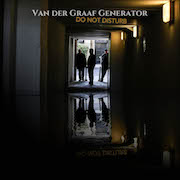Since reforming in 2005, Van der Graaf Generator have kept up a steady stream of new releases, cementing their status as the last survivors of the golden age of progressive rock. (Although King Crimson remain active on the touring front, Robert Fripp has so far shown no desire to take the current incarnation of KC into the studio.) Do Not Disturb is the fifth album from the reunited VdGG, and the fourth since the acrimonious departure of sax and flute player David Jackson left the group as a trio.
In interviews to promote the record, the group’s singer, guitarist and principal songwriter Peter Hammill has commented on the fact that he, organist Hugh Banton and drummer Guy Evans are all approaching their 70th birthdays. Although Hammill has stopped short of stating outright that this will be the last VdGG album, he has at least acknowledged the possibility. What’s more, it’s clear that awareness of this possibility has informed the writing on Do Not Disturb, which has an air of finality about it that is striking even in the context of Hammill’s lifelong lyrical preoccupations with age, maturity and the passing of time. Back in 2005, one of Hammill’s stated reasons for reforming VdGG (after years of saying he would never do so) was that the group only ever saw each other at the funerals of ex-road crew members, and therefore that if they were ever to reform, now was the time to do it. It’s appropriate, then, that this new album comes freighted with a sense of lines being drawn under a life’s work.
VdGG’s last album of new songs, 2011’s A Grounding In Numbers, was a scrappy affair, consisting largely of short songs that didn’t fully allow the trio to unleash the manic instrumental flights for which they are renowned. It’s something of a relief, therefore, to find that they have given themselves more room to stretch out this time, with six of the album’s nine tracks clocking in at around the seven to eight minute mark. What’s new, and startlingly so, is the way these songs pack a vast amount of drama and incident into those seven or eight minutes. Opener “Aloft” begins with leisurely guitar from Hammill and restrained cymbal work from Evans, before Hammill’s exquisite voice enters, burning with loss and regret. But there’s no time to dwell on the lyric’s sombre reflection on missed opportunities, as Banton’s miraculous organ tears the song wide open. Hammill and Evans respond with angry riffing and thunderous percussion, only for Banton to re-emerge with more stabbing organ. Cleaving urgently to the organist’s powerhouse lines, Hammill declaims furious words of condemnation: “Are you joking? Were you hoping for some jolly japes? Eat those words or spit them out before they choke you.”
As the album progresses, traces of the group’s history emerge in fleeting, cinematic flashbacks. “Alfa Berlina” recalls their early success in Italy, where their 1971 album Pawn Hearts reached number 1 in the album charts; touring heavily to capitalise on its success, their promoter drove them from gig to gig in the eponymous saloon car. “Room 1210” ruefully evokes the rigours of touring, when a hotel room was the only place where a moment’s privacy could be snatched; and there’s even an element of score-settling in “Forever Falling”. Musically, the song represents a throwback to Hammill’s underrated K Group period of the early 1980s, with a nagging riff that could have come straight from solo albums like Enter K or Patience. Lyrically, though, it almost certainly takes caustic aim at the departed Jackson, whose apparent unreliability and lack of commitment to the cause were key factors in his 2006 dismissal from the group.
To a greater extent here than on previous trio outings, VdGG make efforts to compensate for the absence of Jackson with a more varied instrumental palette. These songs are like compressed multi-part epics, lurching deliriously from moments of piano-led tranquillity to ragged guitar-and-drums freakouts. Banton augments his organ work with deep, resonant bass and tender washes of accordion, there’s a (tad overlong, to tell the truth) jazzy break in the middle of the exuberant rocker “(Oh No I Must Have Said) Yes”, while the frenetic instrumental coda to “Almost the Words” is as wild and driven as anything you’ll hear all year. Only on the plaintive closing track “Go” does the mood finally darken, with Hammill’s tone of weary resignation looming over Banton’s desolate organ: “more or less, all for the best, in the end it’s all behind you.”
Inevitably there’s nothing here to rival the dark majesty of Van der Graaf Generator’s classic 1970s work, and newcomers should start with Still Life, Godbluff or Pawn Hearts. But Do Not Disturb is a worthy addition to the group’s canon and – if this is indeed their last album – a fitting end to an illustrious career.


